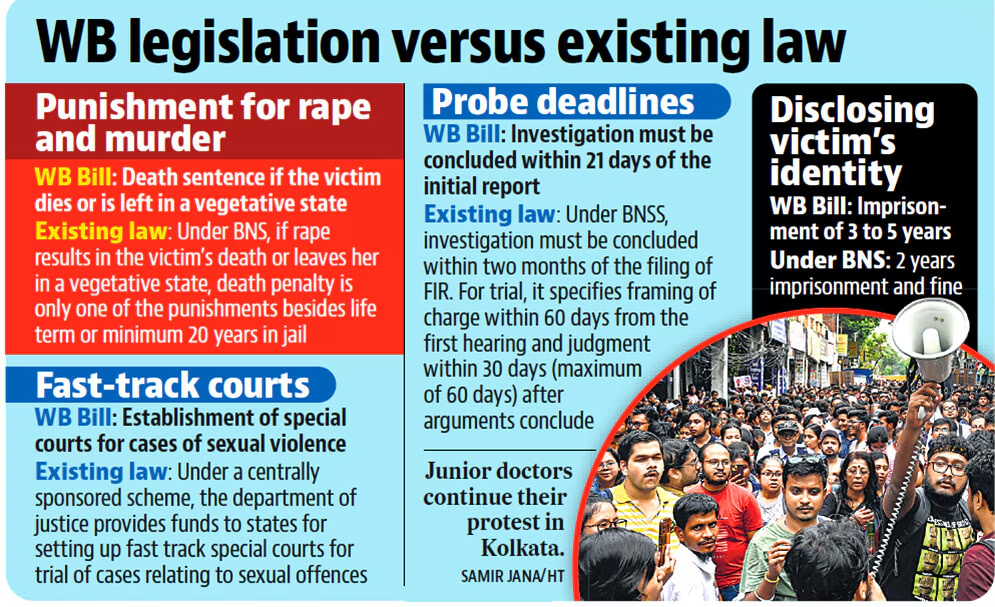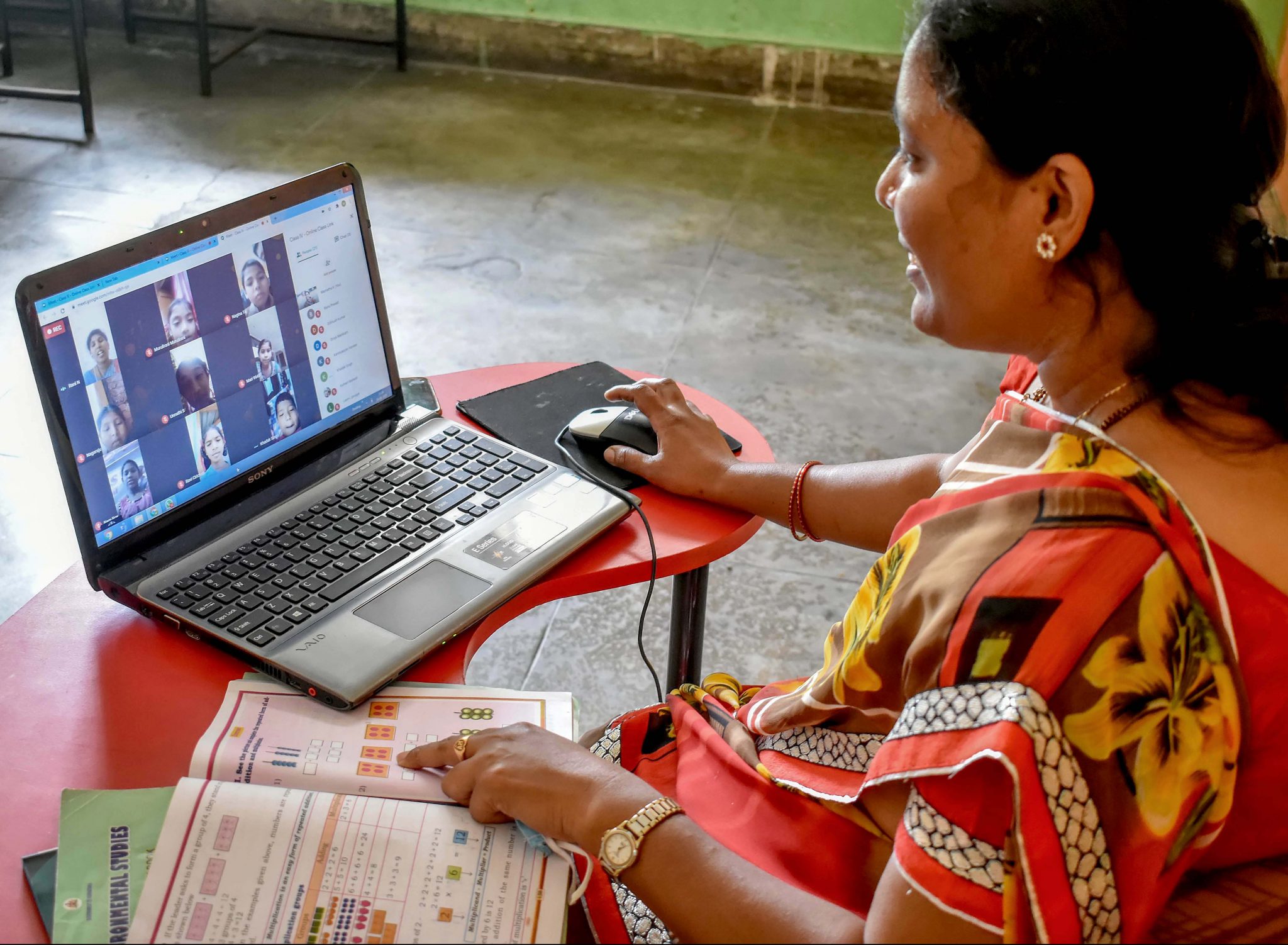- Courses
- GS Full Course 1 Year
- GS Full Course 2 Year
- GS Full Course 3 Year
- GS Full Course Till Selection
- Answer Alpha: Mains 2025 Mentorship
- MEP (Mains Enrichment Programme) Data, Facts
- Essay Target – 150+ Marks
- Online Program
- GS Recorded Course
- Polity
- Geography
- Economy
- Ancient, Medieval and Art & Culture AMAC
- Modern India, Post Independence & World History
- Environment
- Governance
- Science & Technology
- International Relations and Internal Security
- Disaster Management
- Ethics
- NCERT Current Affairs
- Indian Society and Social Issue
- NCERT- Science and Technology
- NCERT - Geography
- NCERT - Ancient History
- NCERT- World History
- NCERT Modern History
- CSAT
- 5 LAYERED ARJUNA Mentorship
- Public Administration Optional
- ABOUT US
- OUR TOPPERS
- TEST SERIES
- FREE STUDY MATERIAL
- VIDEOS
- CONTACT US
Bengal Assembly Passes Strict Anti-Rape Bill
Bengal Assembly Passes Strict Anti-Rape Bill
07-09-2024

In response to the tragic rape and murder of a junior doctor at R G Kar Medical College and Hospital in Kolkata on August 9, the West Bengal Assembly has unanimously passed the Aparajita Woman and Child (West Bengal Criminal Laws and Amendment) Bill, 2024. This Bill introduces severe penalties for rape and seeks to expedite the legal process.
Key Provisions of the Aparajita Bill 2024:
- Capital Punishment for Severe Cases:
- The Bill proposes the death penalty for rape if the attack results in the victim’s death or a permanent vegetative state. For other cases, it mandates a life sentence without parole.
- Faster Investigation and Trials:
- Investigations must be completed within 21 days of the initial report.
- Under BNSS laws , the time limit for investigation and trial is 2 months from the date of FIR.
- A senior police officer can extend this period by up to 15 days if necessary.
- Women Officers Leading Investigations:
- Women officers will lead investigations conducted by a Special Task Force dedicated to handling sexual violence cases.
- Establishment of Fast-Track Courts:
- The Bill proposes setting up specialized courts to handle rape and sexual offence cases quickly and effectively.
- Aparajita Task Force:
- A Special Task Force at the district level, led by a Deputy Superintendent of Police, will investigate rape and related crimes against women and children.
- Amendments to Existing Laws:
- The Bill aims to amend parts of the Bharatiya Nyaya Sanhita (BNS) 2023, the Bhartiya Nagarik Suraksha Sanhita (BNSS) 2023, and the Protection of Children from Sexual Offences (POCSO) Act, 2012, to increase punishments and expedite legal procedures.
- Penalties for Delays and Negligence:
- Police and medical staff who delay investigations or show negligence will face penalties, including possible imprisonment.
- Protection of Victim Identity:
- The Bill includes strict penalties for unauthorized publication of court proceedings related to sexual offences, with imprisonment of 3 to 5 years.
Political Reactions
- Mamata Banerjee:
- Described the Bill as “historic” and defended her government’s actions on women’s safety. She criticized the central government and demanded the resignation of Prime Minister Narendra Modi and Union Home Minister Amit Shah, as well as Chief Ministers of states with weak women’s safety measures.
- Opposition BJP:
- Accused the Trinamool Congress (TMC) of trying to shift the focus of the R G Kar Hospital case and demanded Banerjee’s resignation. BJP’s Suvendu Adhikari proposed amendments targeting negligence by police and medical personnel.
Amendments and Proposals:
- Amendments to BNS:
- The Bill proposes changes to sections related to punishments for rape, gang-rape, repeat offenders, and disclosure of victim identity. Sections related to punishments for rape perpetrators under 16, 12, and 18 years are proposed to be removed.
- Proposed Amendments by BJP:
- Suggests life imprisonment for police or medical personnel who delay investigations or tamper with evidence. Banerjee agreed to review these suggestions for possible inclusion.
Challenges Related to the Aparajita Bill 2024:
- Constitutional Validity:
- The Bill’s attempt to amend central laws raises concerns about its constitutionality. States can legislate on issues in the State List, but criminal laws fall under the Concurrent List, which may require Presidential approval if the Bill overrides central laws.
- Unrealistic Time Frame:
- Completing investigations within 21 days may be impractical due to the complexity of rape cases and existing legal system delays.
- Legal Challenges:
- State amendments to central laws often face judicial scrutiny. Past cases, such as State of West Bengal v. Union of India (1964) and KK Verma v. Union of India (1960), highlight the potential conflicts between state and central legislation.
- Implementation Challenges:
- Effective implementation requires upgrading infrastructure, training for police and judicial officers, and addressing existing delays in the legal system.
- Overburdened Courts:
- Indian courts face significant delays, with cases taking an average of over 13 years to resolve, potentially hindering timely trials.
- Legal Rights of the Accused:
- The right to a fair trial and the possibility of appeals and mercy petitions can prolong legal processes.
Laws Related to Rape in India
|
Rights of a Rape Victim:
- Right to Zero FIR:
- Allows filing an FIR at any police station, regardless of where the crime happened.
- Free Medical Treatment:
- Section 357C of the CrPC mandates free medical treatment for rape victims in both private and government hospitals.
- No Two-Finger Test:
- Prohibits the use of the two-finger test during medical examinations of rape victims.
- Right to Compensation:
- Section 357A of the CrPC provides compensation to victims of sexual violence.
Challenges in Addressing Women’s Security:
- High Incidence of Crimes Against Women:
- Reports show an increase in crimes against women, rising from 3.37 lakh in 2014 to 4.45 lakh in 2022.
- Patriarchal Mindset:
- Deep-rooted patriarchy and male dominance create a hostile environment for women, affecting their safety and equality.
- Objectification in Media:
- Media often objectifies women, reinforcing harmful stereotypes and contributing to a culture that undermines women’s rights.
- Delayed Justice and Legal Challenges:
- Slow legal processes and infrequent death penalty impositions exacerbate trauma for victims.
- Lack of Awareness and Education:
- Inadequate sex education and discussions on consent perpetuate harmful stereotypes and ignorance.
- Infrastructure and Safety Measures:
- Poorly lit streets, inadequate public transport, and lack of safe public facilities increase women’s vulnerability.
Way Ahead
- Comprehensive Legal Framework:
- Strengthen penalties, introduce specific laws for various forms of harassment, and set up specialized courts for swift justice.
- Fast-Track Courts:
- Create fast-track courts for serious cases and increase women’s representation in the judiciary.
- Social and Cultural Transformation:
- Include gender equality education in schools, support community initiatives, and implement policies for women’s empowerment.
- Effective Law Enforcement and Justice Systems:
- Provide gender-sensitive training for police, create specialized units, and establish victim support centers.
- Infrastructure and Technology:
- Improve public transport, install CCTV cameras, and develop safety apps and emergency response systems.
- Empowerment and Awareness:
- Conduct awareness campaigns, offer vocational training, and support advocacy efforts to educate women about their rights.
Conclusion
The Aparajita Bill 2024 is a significant legislative step in West Bengal to address sexual violence by proposing strict penalties and procedural changes. However, it also highlights ongoing political and legal discussions about women’s safety and the effectiveness of current laws.




